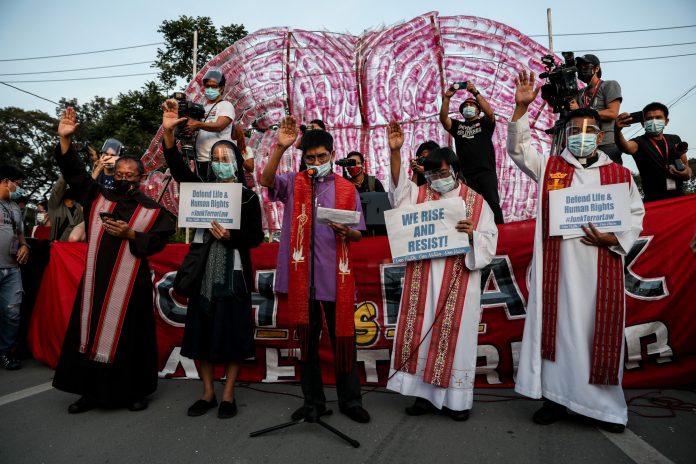Retired Bishop Arturo Bastes of Sorsogon called on Filipinos to monitor the oral arguments on the country’s new anti-terror law at the Supreme Court on Tuesday, February 2.
The prelate said it is important for everyone to follow the proceedings because the law will have an impact on the country’s democracy.
“This anti terror law is harmful to our democracy,” said the bishops, adding that with the law the president “will become a dictator.”
Bishop Broderick Pabillo of Manila issued the same appeal, saying the people should know what is happening in the country “and they can react.”
Meanwhile, a group of priests and religious appealed to members of the Supreme Court to declare the new law “unconstitutional.”
The group said terrorism and acts of terror do not exist as a national reality in the Philippines. They said if there are terrorists, these could only be confined in some small areas in Mindanao.
The Student Christian Movement of the Philippines marked the first day of February as a “national day of protest” to call for the junking of the anti-terror law.
“The terror law essentially weaponizes the law and criminalizes dissent,” said the students in a statement.
Oral arguments on 37 petitions that challenged the constitutionality of the anti-terror law will be conducted by the Supreme Court starting 2:30 p.m. on Tuesday.
Only Supreme Court justices, designated government lawyers and counsel of petitioners, and the amicus curiae (friend of the court) are allowed physically inside the full court session hall.
Members of the media can monitor the proceedings inside the session hall through screens set up at the lobby of the court.
The Supreme Court had originally set the oral arguments sometime in September last year but it decided to postpone the schedule to January 19 due to various petitions filed.
The justices later moved the schedule again to February 2 on request of government lawyer Jose C. Calida who manifested that some members of his staff who would attend the oral arguments had been infected with the coronavirus disease.
The 37 petitions, most of which wanted the law nullified in its entirety, were filed by two retired justices, human rights groups, constitutionalists, journalists, lawmakers, militant labor groups, students, even social media influencers, indigenous groups, and other advocacy groups.
Most of the petitioners have reiterated their plea for the issuance of a temporary restraining order that would stop the implementation of the law.
But the Supreme Court said the pleas for a restraining order will be resolved as soon as the oral arguments are terminated.









